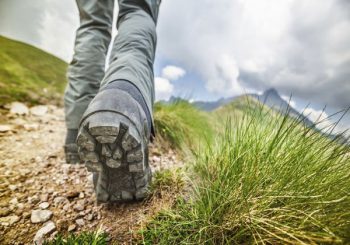Guest Writers for Wake Up World
You can’t change your age. If you’ve been on this earth for 50 years, you’re 50. Not 49, not 35, just 50. But you CAN change your biological age, which means that your physical health is the equivalent of someone older or younger. A recent study published in Communications Biology a simple step you can take to reduce your biological age by years.
Well, several steps…
What the Research Says
According to a new study from the University of Leicester and Leicester Biomedical Research Centre, brisk walking can reduce the signs of aging by up to 16 years! looked at genetic data from 405,981 middle-aged UK residents, averaging in their mid 50s. They compared the typical self-reported walking pace of participants with signs of biological aging by measuring a key marker of cellular health called telomeres.
Telomeres are the tail ends of chromosomes, or strands of our DNA, and provide stability as cells divide over time. As we age, telomeres become shorter, like a candle slowly burning down. These shorter telomeres are linked to the signs of aging as well as age-related illnesses like cancer.
Previous research has suggested that higher levels of physical activity and cardiovascular fitness could be linked to longer telomeres, and potentially slower biological aging. The researchers found that people who regularly enjoyed brisk walking were more likely to have longer telomeres.
The study utilized a large sample size from a reliable source, making the results very strong. The research team also adjusted for many different dietary and health-related factors, including health conditions, smoking, drinking alcohol, salt intake, and fruit and vegetable consumption.
But it would seem that a brisk walking pace provides a HUGE boost to your overall health.
Thomas Yates, the study’s lead author, said, “You can ask people what they eat, you can ask people how active they are, how much they sleep, all those other lifestyle factors and behaviors, and none of those come anywhere close to being as important as walking pace.”
People with a habitually faster walking pace (more than three miles an hour) were found to have longer telomeres, on average, than their slower-walking peers, according to the data. Furthermore, the benefits seemed to be linked to the intensity of the activity, rather than the total number of steps or walking duration.
Why It Matters
The results are significant because while prior research has shown a link between a brisk walking pace and fewer markers of aging, this new study suggests that walking quickly is the cause of the benefits.
“In this study we used information contained in people’s genetic profile to show that a faster walking pace is indeed likely to lead to a younger biological age as measured by telomeres,” says Yates.
Another study, in the European Journal of Cancer Care, found that Nordic walking can be extremely beneficial to breast cancer patients.
After evaluating nine different studies, the research team found that Nordic walking positively impacts lymphedema (swelling caused by damaged lymph nodes), physical fitness, disability, and morbid perceptions (the “NOcebo” effect). The best part? There were absolutely ZERO adverse effects for the patients.
Some studies also showed an improvement in depression, pain, and shoulder-arm mobility (a symptom that many patients suffer chronically after treatments).
According to the study’s co-author Jorge Torres:
“The main strategy in rehabilitation for women with breast cancer is a change of habits, where physical exercise is a fundamental tool. It’s not easy to turn a sedentary person into an amateur athlete, so sports such as Nordic walking are accepted more easily.”
The Benefits of Exercise
Once again, it turns out that healthy lifestyle choices are the best way to keep your body healthy and disease-free. One study published in the JAMA Network Open found that a lack of exercise posed a health risk equal to or greater than traditional factors such as smoking, heart disease, and diabetes. Conversely, cardiorespiratory fitness (CRF) was found to have a direct correlation with health and longevity.
And the benefits of exercise are myriad. Here are 7 proven benefits of regular exercise:
1 | Exercise is part of a healthy weight control plan. Obesity is a primary risk factor for cancer, metabolic syndrome, heart disease, diabetes, arthritis, and many other serious health conditions.
2 | Exercise helps improve mood and prevent depression – a serious side effect of cancer diagnosis and cancer treatment. Exercise boosts the production of the endorphin hormones in the brain that make you feel happier and more relaxed.
3 | Exercise improves energy levels by boosting your body’s circulation and delivery of oxygen to your cells. Over time, your heart, lungs, and muscles get stronger and work more proficiently.
4 | Exercise results in better (and deeper) sleep if you suffer from insomnia – a common complaint amongst patients struggling with the anxiety of their cancer crisis.
5 | Exercise helps your body detoxify. It boosts the excretory system so that cancer-causing toxins and waste are removed more efficiently. The fewer the toxins in your system, the better you’ll feel overall. The excretory system consists of your blood, lymph, bladder, kidneys, and intestines.
6 | Exercise enhances your immune system (specifically the lymphatic system), preventing the growth and spread of disease-causing organisms in your body. A strong immune system is your best defense against cancer.
7 | Regular exercise makes you more conscious of your overall lifestyle choices. People who exercise regularly tend to be more attentive to their food choices and water intake. They are also more likely to eliminate pro-inflammatory substances such as dairy, processed foods and excessive alcohol consumption.
Americans are over-medicated. Because our medical institutions are funded and led by the pharmaceutical industry, we now live in a world with “a pill for every ill.” But you can take control of your health and live a longer, healthier life. All you have to do is make small, healthy lifestyle choices each and every day.
According to the latest research, that includes getting outside for a nice, brisk walk.
Now get to stepping!
References:
Originally published at The Truth About Cancer and reproduced here with permission.
About the author:
 Ty Bollinger is a health freedom advocate, cancer researcher, former competitive bodybuilder and author. After losing several family members to cancer, he refused to accept the notion that chemotherapy, radiation, and surgery were the most effective treatments available for cancer patients. He began a quest to learn all he possibly could about alternative cancer treatments and the medical industry. What he uncovered was shocking. There is ample evidence to support the allegation that the “war on cancer” is largely a fraud and that multinational pharmaceutical companies are “running the show.” Ty has now made it his life mission to share the most remarkable discovery he made on his quest: the vast majority of all diseases, including cancer, can be easily prevented and even cured without drugs or surgery.
Ty Bollinger is a health freedom advocate, cancer researcher, former competitive bodybuilder and author. After losing several family members to cancer, he refused to accept the notion that chemotherapy, radiation, and surgery were the most effective treatments available for cancer patients. He began a quest to learn all he possibly could about alternative cancer treatments and the medical industry. What he uncovered was shocking. There is ample evidence to support the allegation that the “war on cancer” is largely a fraud and that multinational pharmaceutical companies are “running the show.” Ty has now made it his life mission to share the most remarkable discovery he made on his quest: the vast majority of all diseases, including cancer, can be easily prevented and even cured without drugs or surgery.
For more information, visit:

If you've ever found value in our articles, we'd greatly appreciate your support by purchasing Mindful Meditation Techniques for Kids - A Practical Guide for Adults to Empower Kids with the Gift of Inner Peace and Resilience for Life.
In the spirit of mindfulness, we encourage you to choose the paperback version. Delve into its pages away from screen glare and notifications, allowing yourself to fully immerse in the transformative practices within. The physical book enriches the learning process and serves as a tangible commitment to mindfulness, easily shared among family and friends.
Over the past few years, Wake Up World has faced significant online censorship, impacting our financial ability to stay online. Instead of soliciting donations, we're exploring win-win solutions with our readers to remain financially viable. Moving into book publishing, we hope to secure ongoing funds to continue our mission. With over 8,500 articles published in the past 13 years, we are committed to keeping our content free and accessible to everyone, without resorting to a paywall.







